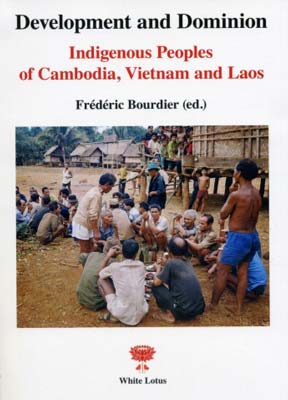-

Argentina
-

Australia
-

Austria
-

Bangladesh
-

Belgium
-

Bhutan
-

Brazil
-

Bulgaria
-

Cambodia
-

Canada
-

China
-

Croatia
-

Czechia
-

Denmark
-

Estonia
-

Finland
-

France
-

Germany
-

Greece
-

Hong Kong
-

Hungary
-

India
-

Indonesia
-

Iran (Islamic Republic of)
-

Ireland
-

Israel
-

Italy
-

Japan
-

Lao People's Democratic Republic
-

Luxembourg
-

Malaysia
-

Mexico
-

Morocco
-

Myanmar
-

Netherlands
-

New Zealand
-

Nigeria
-

Norway
-

Oman
-

Pakistan
-

Philippines
-

Poland
-

Portugal
-

Qatar
-

Republic of Korea
-

Romania
-

Russian Federation
-

Serbia
-

Singapore
-

Slovakia
-

Slovenia
-

South Africa
-

Spain
-

Sri Lanka
-

Sweden
-

Switzerland
-

Taiwan
-

Thailand
-

Turkey
-

United Arab Emirates
-

United Kingdom
-

United States of America
-

Vietnam
Development and Dominion: Indigenous Peoples of Cambodia, Vietnam and Laos
Development and Dominion: Indigenous Peoples of Cambodia, Vietnam and Laos
This book deals with prevailing development ideologies and their impacts on indigenous societies with a particular focus on Cambodia, Laos and the central highlands of Vietnam. It reinforces the idea that development, as it is conceptualized and implemented, radically undermines local communities’ ability to control the parameters of inevitable social and material changes. The more development projects choose new objectives and operating models the more the rhetoric and practices remain the same. One of the strengths of the presentations is to convincingly advocate closer ethnographic understanding in order to make any sort of cross-cultural negotiations and mutual engagement meaningful. This imperative is known to some extent, but it needs to be implemented more vigorously to make it more persuasive. As a result, anthropology of development rather than development anthropology is proposed. The essential difference lies in the point of engagement. Development anthropology seeks to do development better, by trying to mitigate the effects of top-down programs and allow some breathing space for local people to express their input. Anthropology of development, on the other hand, questions the very operating premises of contemporary development. This point is very much in line with the intent of the current book, even if some of the authors in this book opt to challenge this position, being convinced that it is not the best strategy to offer radical critiques that few people in the world of development listen to, and preferring to work within the world of development programs in the hope of providing salient lessons and constructive models.
 Standard Delivery
Standard Delivery
10 - 14 days
USD$ -
| PUBLISHER: | White Lotus |
| ISBN: | 9789744801524 |
| AUTHOR | Bourdier, Frederic |
| RELEASED | 2009-03-29 |
| Bangkok 2009, | |
| WL CODE | E22632 |
| SIZE | 502 pp., 24 pp. illus., 7 pp. maps, 150 x 210 mm |
| BOOK WEIGHT | 0.700 Kg |
| PACKING WEIGHT | 0.200 Kg |
RECOMMENDED CATEGORIES
OTHER BOOKS
Other books you might be interested in.
JUST IN CASE
We save it for you. These are books you just viewed.








 Books by Category
Books by Category Back
Back
 ADD TO CART
ADD TO CART






